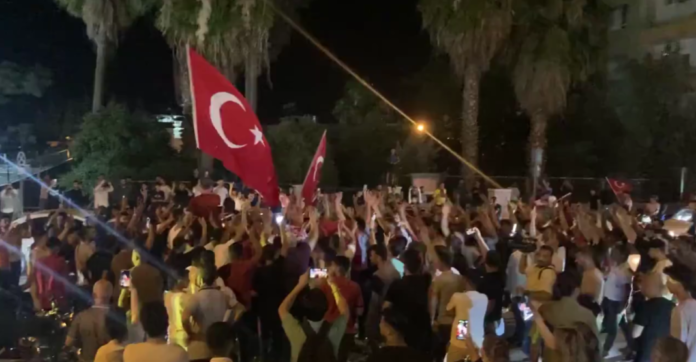Turkish police detained 474 people involved in a wave of anti-Syrian riots, leading to widespread property damage and heightened tensions across the country after armed protesters and Turkish forces clashed in Syria’s Turkey-controlled northwest Monday in demonstrations sparked by violence against Syrians in Turkey on Sunday, Turkish Minute reported.
In Turkey’s central Kayseri province on Sunday, a mob attacked Syrian-owned businesses and homes, setting a grocery store on fire. Videos of the incident circulated on social media, prompting President Recep Tayyip Erdoğan to condemn the violence.
The unrest quickly spread to other cities. In Gaziantep on the Syrian border, groups chanted nationalist slogans while vandalizing Syrian-owned vehicles and businesses.
In the Reyhanlı district of Turkey’s southern Hatay province, crowds chanted anti-refugee slogans and organized convoys with Turkish flags. Meanwhile, in Adana, police blocked entry to a predominantly Syrian neighborhood to prevent further violence. A Syrian refugee in Adana posted a video showing his bloodied face, claiming he had been attacked. Turkish-flagged convoys were also reported in the area.
The central province of Konya witnessed attacks on Syrian-owned businesses, with footage showing a Syrian shopkeeper being beaten by a crowd.
The violence in Kayseri continued on Monday, with thousands of protesters chanting nationalist slogans and marching through neighborhoods with a large Syrian population. Journalist Hazar Dost reported that the internet had been slowed by service providers in the city to prevent fueling of unrest through social media. Despite police efforts to disperse the crowd using tear gas, percussion bombs and plastic bullets, the protesters regrouped. At least 10 people were detained, and several roads were closed to traffic.
Interior Minister Ali Yerlikaya announced that 474 people had been detained in connection with the recent violence, adding that 285 of the detainees have criminal records for various offenses. Yerlikaya emphasized the importance of restraint and urged citizens not to be provoked and not to engage in illegal activities that harm people, the environment or property.
This comes after protests broke out in Syria’s northwestern regions controlled by Turkey on Monday, in response to the violence against Syrians in Turkey. Clashes between armed demonstrators and Turkish forces in Syria’s Afrin district resulted in seven deaths and over 20 injuries, according to the Syrian Observatory for Human Rights. Protesters attacked Turkish trucks and pulled down Turkish flags.
On Monday evening the Turkish Foreign Ministry issued a statement on X condemning what it claimed was the exploitation of the incidents in Kayseri for “provocations” in northern Syria, saying Turkey is committed to the well-being of the Syrian people.
Turkey hosts approximately 3.2 million Syrian refugees, and xenophobic violence, often fueled by social media rumors, has erupted multiple times in recent years. The fate of these refugees remains a contentious political issue, with Erdoğan’s opponents in the last election promising to repatriate them. This time, however, a possible rift between Erdoğan and his far-right ally, the Nationalist Movement Party (MHP), has led to rumors that the recent outbreak of violence may have been provoked by MHP members.
Interior Minister Yerlikaya announced the arrest of a Syrian man accused of harassment in Kayseri. He said Turkish citizens had unlawfully gathered and damaged properties belonging to Syrians. Yerlikaya emphasized that Turkey is a state of law and order and that such actions are contrary to human values.
As tensions continue to rise, the Turkish government faces pressure to manage the violence and address the underlying issues driving these xenophobic sentiments. Erdoğan hinted at potential talks with Syrian President Bashar al-Assad, which might influence the future of Syrian refugees in Turkey.















